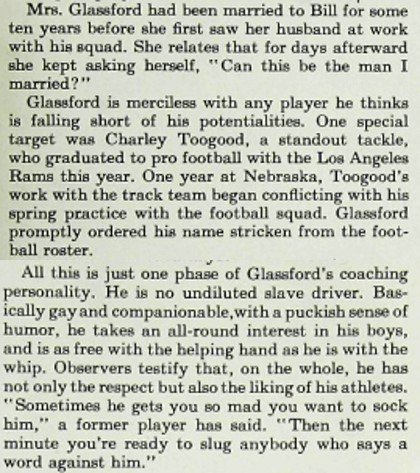
This weekend @HuskerFBNation announced that they would wear helmet stickers to honor George Flippin, the team’s first Black player (1891-94, pic below is the ‘91 team)
It’s good to honor Flippin, but we should also take an honest look at what his time at Nebraska was like
🧵
It’s good to honor Flippin, but we should also take an honest look at what his time at Nebraska was like
🧵
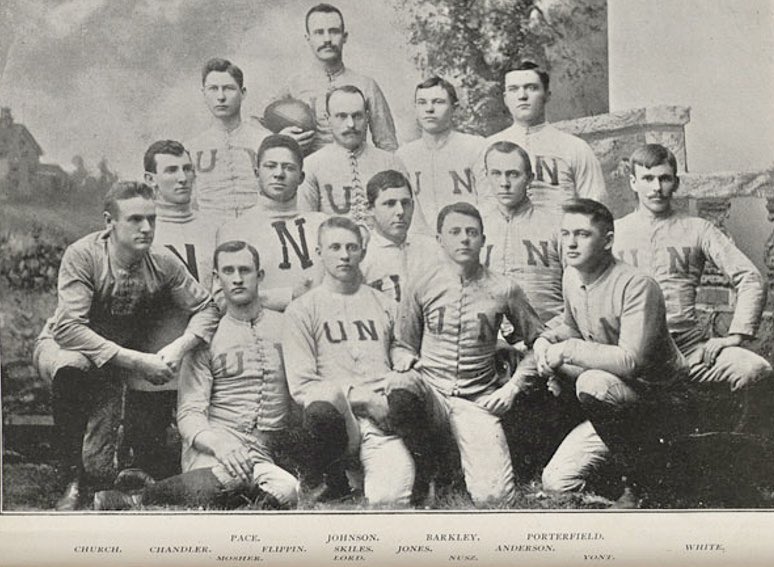
Flippin was one of several Black athletes at PWIs in the late 19c, so he wasn’t unprecedented. But he was unusual.
Flippin’s appearances on the 1891 team earned positive press from Omaha (left) and Iowa’s student newspaper (right), which described him as the team’s best player

Flippin’s appearances on the 1891 team earned positive press from Omaha (left) and Iowa’s student newspaper (right), which described him as the team’s best player

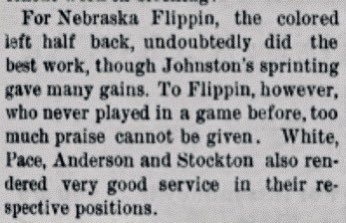
As for his style of play, these descriptions from Nebraska sources provide a nice glimpse. The game back then was more physical, as the forward pass wasn’t legal yet. Having someone who could shake off would-be tacklers and move the line forward was essential. 

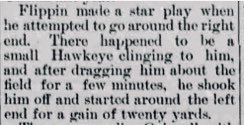
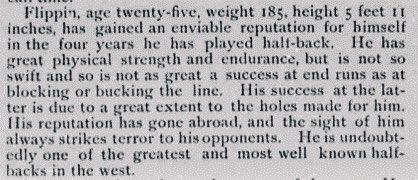
In the 1894 Nebraska yearbook, fellow students had Flippin’s bruising style of play in mind when they composed this satirical English lesson featuring “Old Flip” 
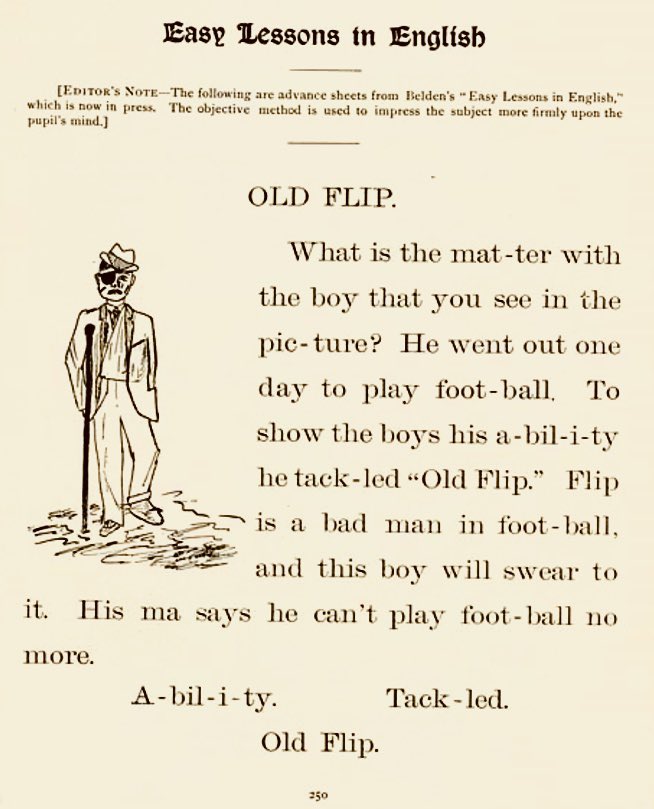
Outside observers noticed Flippin’s skill too. After an 1892 game against Illinois—considered one of his best performances—the Illinois student newspaper described him as a star (left). In 1894 after a game against Missouri, a Kansas City newspaper had similar praise (right) 

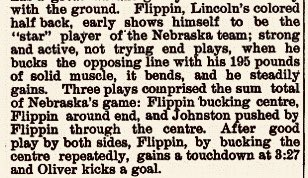
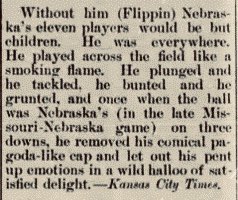
Yet even if other teams respected Flippin, they often complained about him, viewing him as a dirty player who was too physical. Here’s a report along those lines from Denver (left) and from Iowa (right) 

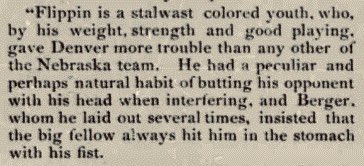
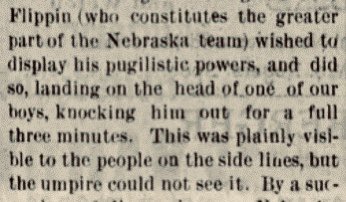
No doubt Flippin was a physical player. But that was the nature of the game. And as the lone Black player on the field, Flippin—like many other “racial pioneers” at PWIs then and after—was often targeted.
Reports from an 1893 game in Denver describe this vividly

Reports from an 1893 game in Denver describe this vividly
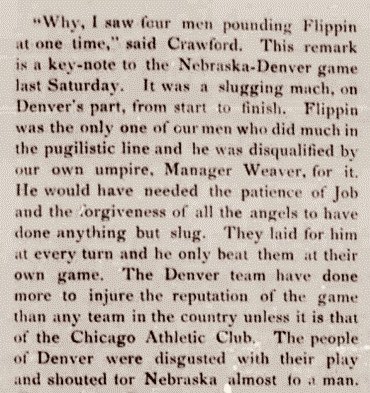
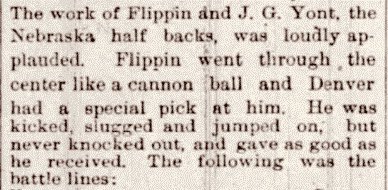
Details on the racial discrimination Flippin might have experienced on the field (excessive violence, racist names, etc) is not always easy to see from newspapers.
But other experiences are documented. In 1892, for example, Missouri refused to play against Flippin and Nebraska
But other experiences are documented. In 1892, for example, Missouri refused to play against Flippin and Nebraska
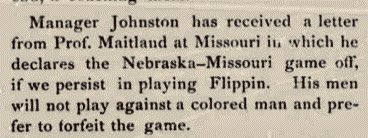
The response from the Nebraska student newspaper was indignant. It attributed Missouri’s actions to the same racism that undergirded the Confederacy, and then claimed that racists on Mizzou’s football team would “get whipped as their fathers [in the Civil War] were whipped” 

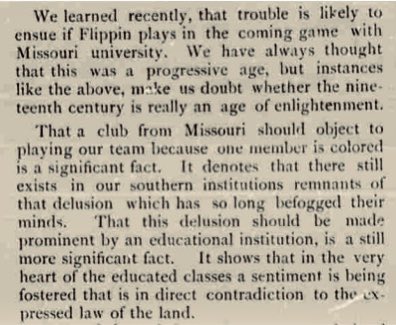
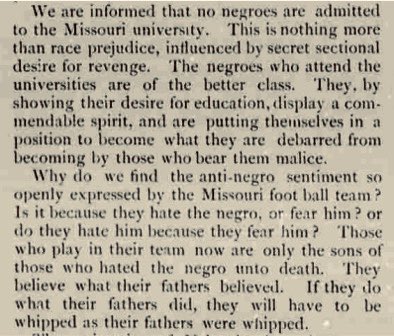
The Nebraska student newspaper was also aghast at Flippin’s treatment in Denver in 1892. During the team’s trip there, a hotel owner was reluctant to accommodate him and an opera house refused to admit him 
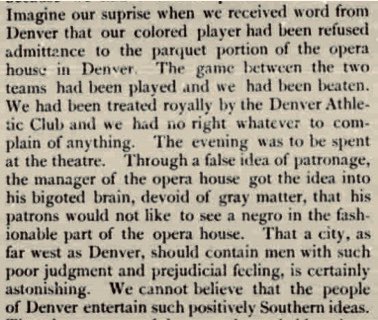
But the truth was that Nebraska wasn’t much different. Flippin may have been a football star, but in 1892 a hotel in Omaha only allowed him in reluctantly—and wouldn’t let him eat in a public space.
In Lincoln in 1893, Flippin sued a bath house that wouldn’t admit him. He lost.

In Lincoln in 1893, Flippin sued a bath house that wouldn’t admit him. He lost.
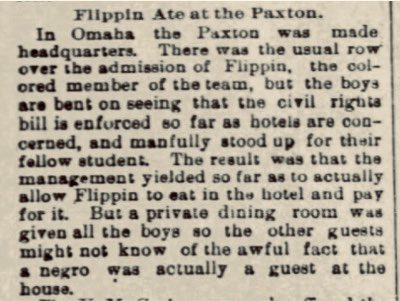
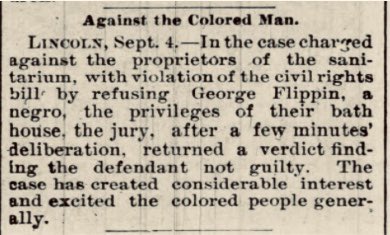
What did Flippin think of all this?
The fact that he sued a Lincoln business tells you something. But we don’t have many examples of his own words. One exception is this speech, first delivered while a student, where he says Black people are “now more a slave than ever before”

The fact that he sued a Lincoln business tells you something. But we don’t have many examples of his own words. One exception is this speech, first delivered while a student, where he says Black people are “now more a slave than ever before”
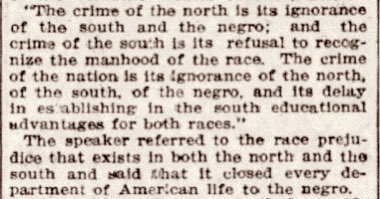
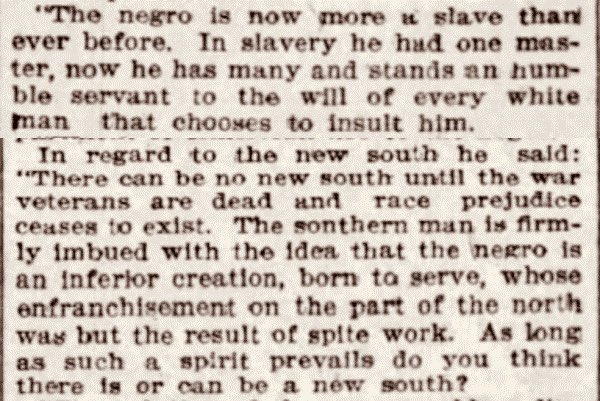
Flippin’s awareness of the ways racism was present in the North played out in a dramatic way in 1894. After the season, he was selected (in an 8-7 vote) as the team’s captain for the next year.
As soon as the vote was done, several teammates declared they wouldn’t play for him

As soon as the vote was done, several teammates declared they wouldn’t play for him
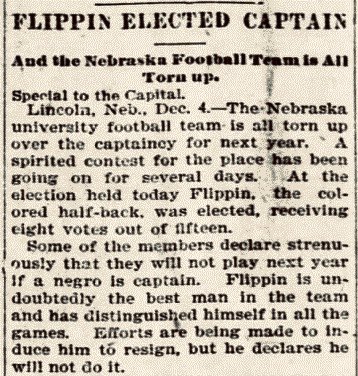
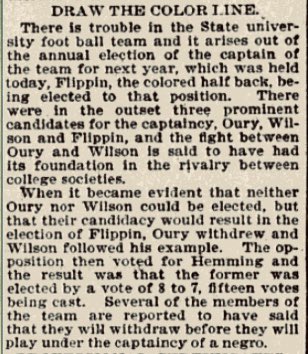
Nebraska’s coach led the charge against Flippin. He told the Omaha World-Herald that Flippin was voted captain by mistake. He said that race had nothing to do with his opposition, but that “it takes a man with brains” to be captain. Flippin, in his view, lacked intelligence. 

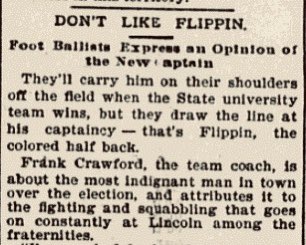
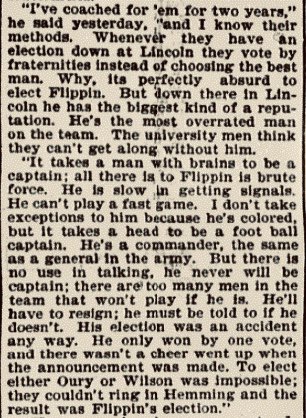
Opinion in Nebraska was divided (as the 8-7 vote suggests). For its part, the Omaha World-Herald published an editorial in support of Flippin’s character and captaincy 

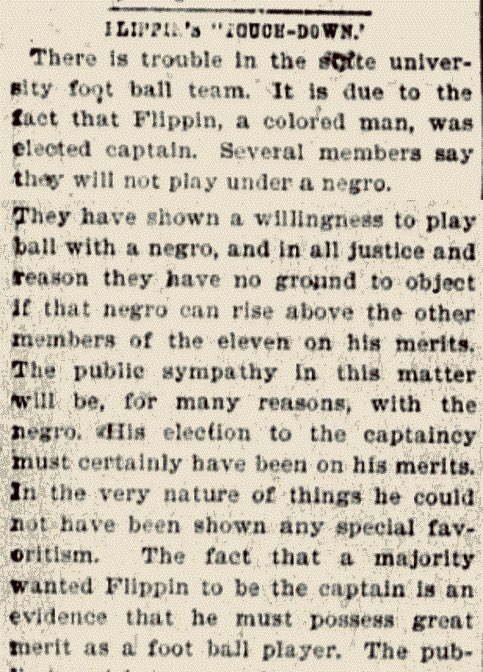
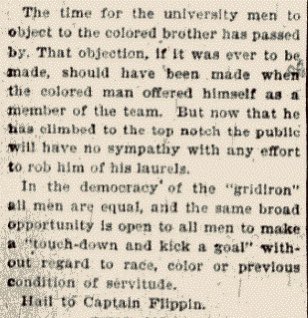
Observers outside the state chimed in, too. In the South, white newspapers gleefully took note of white northerners drawing the color line (left). In Kansas, journalists who had witnessed Flippin play wrote in support of him (right) 

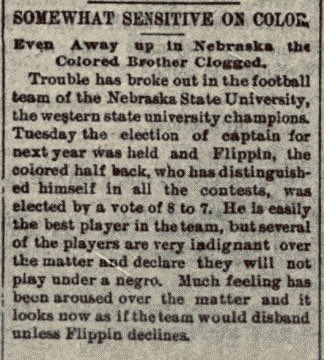
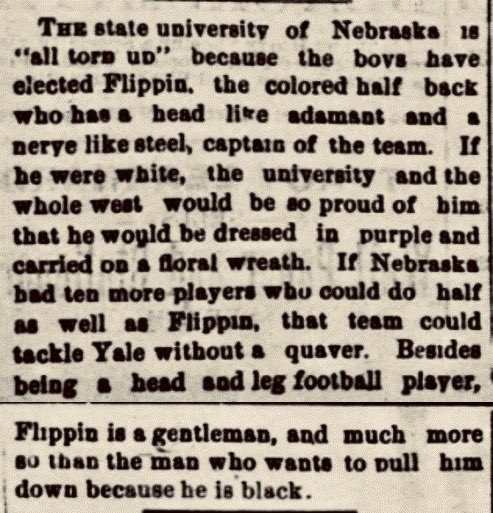
There was no public announcement or statement that reversed the vote or stripped Flippin of his captaincy. But before the 1895 season Flippin moved on from Nebraska. Whether his coach and teammates (pictured with him in this 1894 team photo) forced him out is not entirely clear 
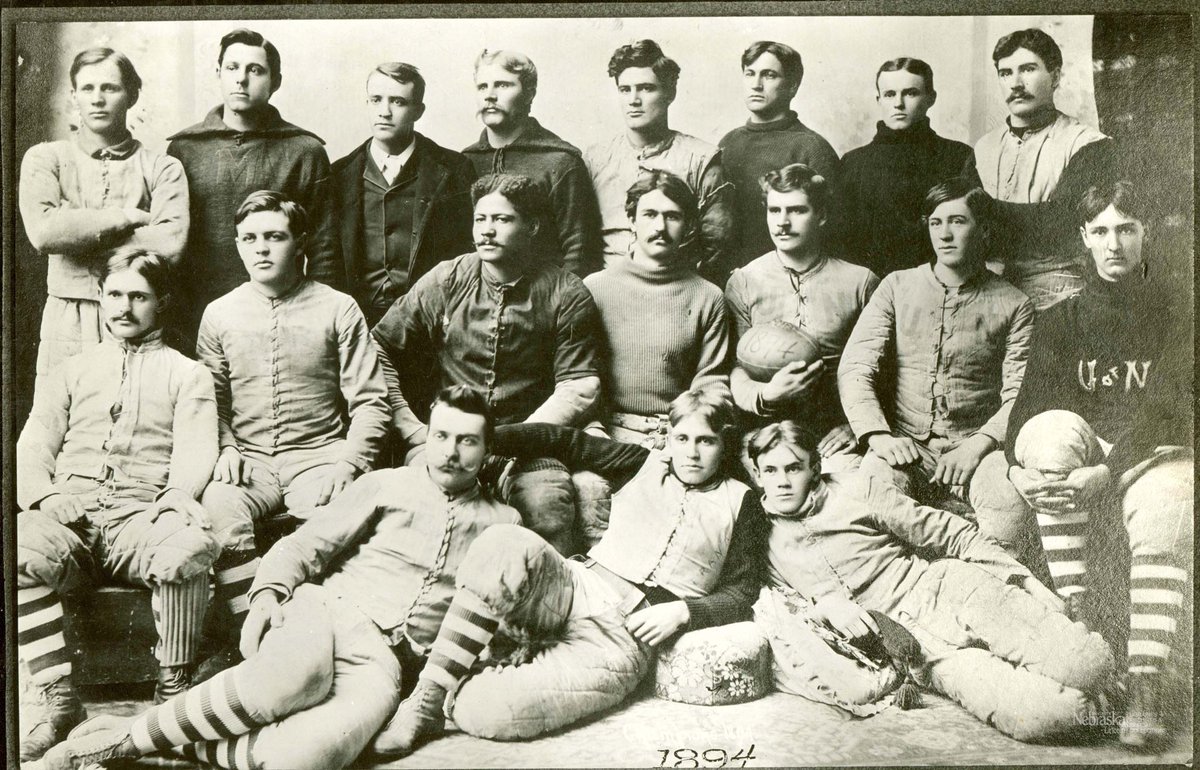
In the wake of the controversy a revisionist view took hold in Nebraska. Flippin’s style of play, which had been endearing, became too brutal.
In 1894 (left) this was used to explain opposition to Flippin’s captaincy. In 1897 (right) the student newspaper called him a “disgrace”

In 1894 (left) this was used to explain opposition to Flippin’s captaincy. In 1897 (right) the student newspaper called him a “disgrace”
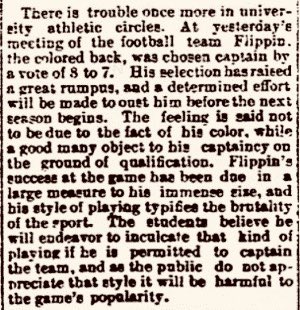
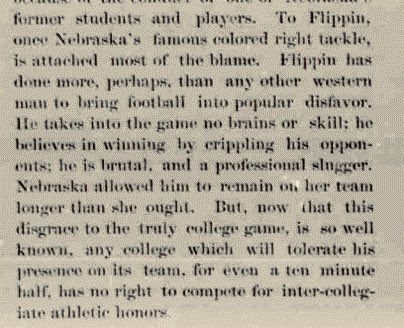
By that time Flippin was attending a medical school in Chicago, playing football for the college to cover some of the educational costs.
After becoming a doctor he eventually made his way back to Nebraska, living there until his death in 1929, as this book documents
After becoming a doctor he eventually made his way back to Nebraska, living there until his death in 1929, as this book documents
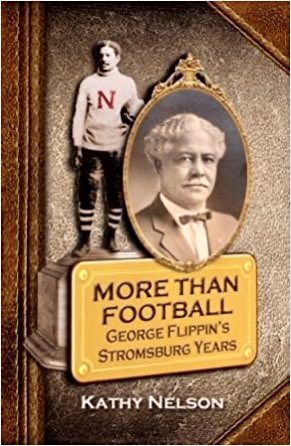
When Flippin passed away, Nebraska newspapers fondly recalled his 1890s football exploits. Charges of disgraceful brutality had faded away. Instead, he was a symbol of strength and traditional values. 

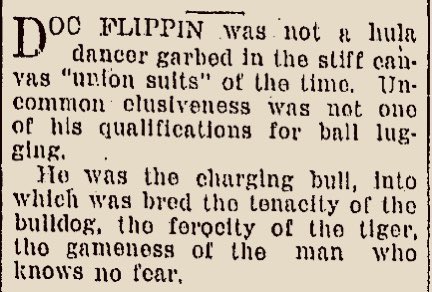
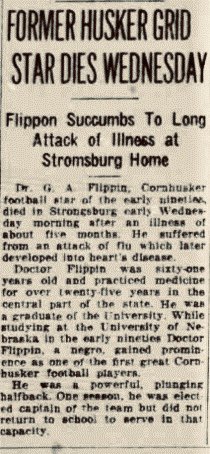
But his death did not seem to inspire any reflection on the fact that Black athletes were no longer allowed to participate at Nebraska.
They’d been shut out since the 1910s, and it would take another two decades before Black athletes competed for the scarlet and cream again.
They’d been shut out since the 1910s, and it would take another two decades before Black athletes competed for the scarlet and cream again.
It's a good thing to honor Flippin. Husker fans should celebrate the role he played in building Nebraska football's foundation in its formative years.
Let's also reflect on the reality of his experiences as a Black man in Nebraska.
#GBR #Huskers
🌽
omaha.com/sports/huskers…
Let's also reflect on the reality of his experiences as a Black man in Nebraska.
#GBR #Huskers
🌽
omaha.com/sports/huskers…
• • •
Missing some Tweet in this thread? You can try to
force a refresh







